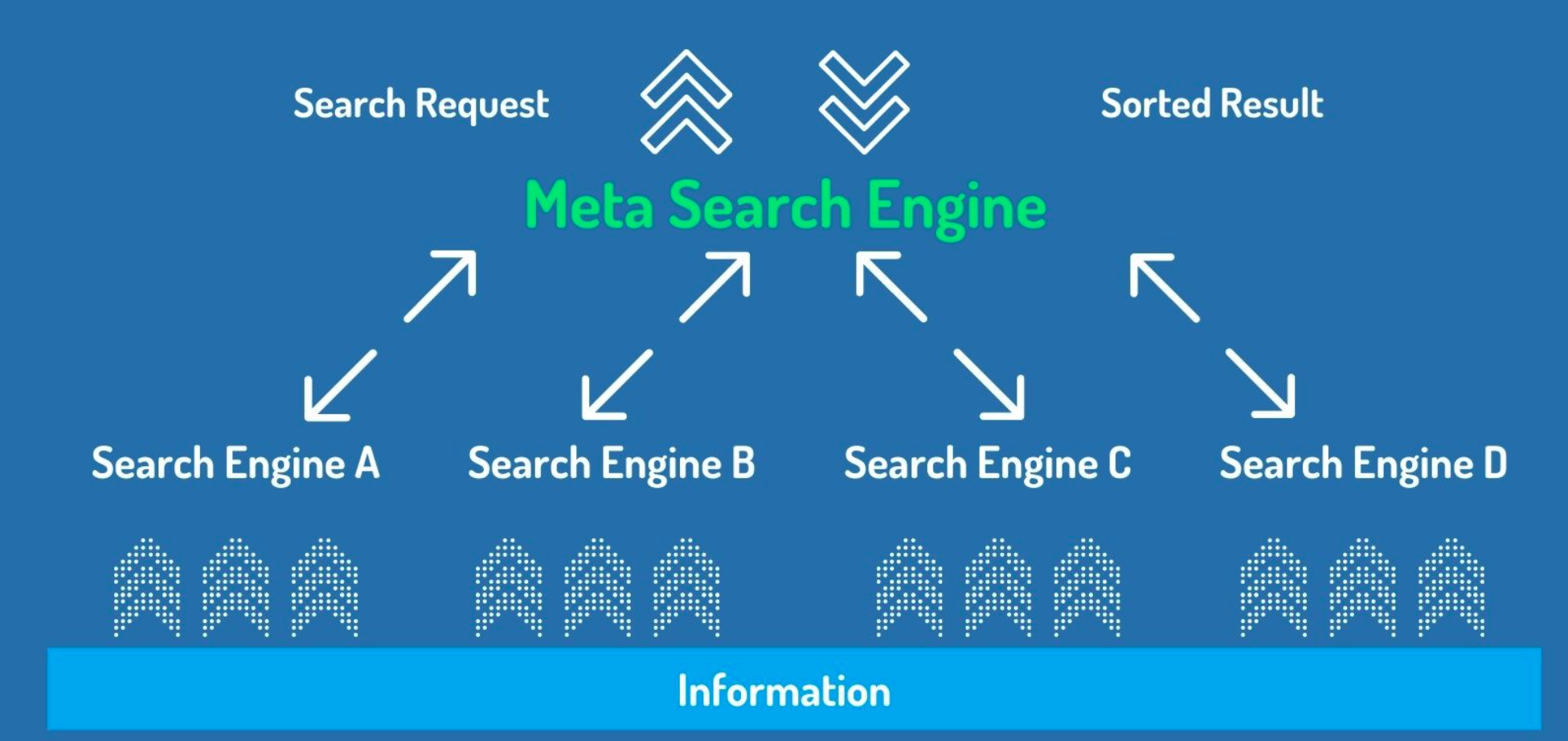Imagine the internet as a giant library. There are so many books that you can’t count them all! Websites, blogs, and social media posts pop up every day. In just one day, we create 3.5 quintillion bytes of data over the internet.
So, it’s hard to find the book you want in such a vast library, right? That’s where meta-search engines come in. Wondering what these are? Read on as we tell you what metasearch engines are, plus;
- How they work
- The differences between meta-search engines and regular search engines
- Their impact on SEO and eCommerce
- Their advantages and disadvantages
Let’s start with the definition!
What Is a Meta Search Engine?

Image Credits: onely.com
A meta-search engine is a unique search engine that doesn’t search the internet directly. Instead, it sends your search request to several other search engines simultaneously. Then, it compiles the results it gets into one list. By pulling information from various sources, a meta-search engine provides a wider variety of results, often including unique content that might not be found using a single search engine.
Some common examples of meta-search engines include:
- Dogpile: This popular metasearch engine fetches results from Google, Yahoo, Bing, and other regular search engines, presenting a diverse selection of web pages, images, and videos.
- MetaCrawler: MetaCrawler was the first meta-search engine ever. It also combines search results from major search engines like Google, Bing, and Yahoo, offering users a comprehensive list of results.
- Yippy: Yippy groups search results into clusters based on topics, making it easier to find relevant information. It gathers results from various search engines and online databases.
How Do Metasearch Engines Work?
Image Credits: hoteltechreport.com
As we have seen, the search engine combines and presents the best results from different search engines. Instead of you searching several search engines manually, meta-search engines do all the heavy lifting.
They simultaneously send your query to standard search engines, collecting the results in one go. This method ensures you get a wider range of responses to your search query.
I. The Process of Gathering Data from Different Search Engines

Image Credits: researchgate.net
The process of data gathering in a meta-search engine involves several elaborate steps, beginning with your search query.
- Receiving your search query: Your journey with a meta-search engine begins when you enter your search query. It might be a single word, a phrase, or a question.
- Dispatching your query: Next, the engine sends your query to several other search engines. This happens nearly simultaneously to ensure you get your results as quickly as possible.
- Translating your query: Because different search engines might use slightly different search languages or protocols, the meta-search engine may need to decode your question into a format each search engine can understand. It could involve changing the wording or structure of the query or adding special codes that specific search engines use.
- Retrieving the results: After each search engine has received your query and searched its database, it sends a list of results back to the metasearch engine. These results usually include web page URLs, along with additional information like the title of the page, a brief description, and possibly a preview image.
- Compiling the search engine results: Finally, the metasearch engine compiles all these results into one list. It might need to translate the results back into a standard format so that they can be easily compared and combined.
This entire process, from receiving your query to compiling the results, takes only a matter of seconds. It allows the metasearch engine to gather a wide range of data from various search engines, giving you a more comprehensive set of results.
II. The Role of Search Engine APIs

Metasearch engines use APIs or Application Programming Interfaces to connect with these search engines and gather results.
APIs are like secret messengers, carrying your search query from the metasearch engine to other search engines and bringing back the results.
Here’s how they work:
- Communicating your search queries: When you enter a search query into a metasearch engine, the APIs send that query to traditional search engines. Note; each search engine has its API, which is like a unique language it uses to communicate.
- Retrieving the results: After each search engine processes your query, the API retrieves the search results and sends them back to the metasearch engine.
- Maintaining order and efficiency: APIs ensure that the metasearch engine can understand the results from the different search engines, even though they might all use other formats or structures.
III. Presentation and Ranking of Results
Image Credits: googleusercontent.com
Once these specialized search engines gather all the search results, the next step is to present them to you in an easy-to-understand and helpful way. This involves two main tasks: ranking the results and displaying them.
- Ranking the results: Meta search engines use unique algorithms to decide what order to show the results in. These algorithms consider factors like how often a result appears in the other search engines, how closely it matches your query, and the source’s reliability. Some metasearch engines might even allow you to adjust the ranking by giving more weight to specific search engines or types of results.
- Displaying the results: After ranking, the metasearch engine presents them in a list for you to browse. They remove duplicates to make the list helpful, ensuring each result is unique. Each result normally includes the title of the web page, a short description, and a link to the page. Many metasearch engines also have a preview image or other additional information.
Differences Between Meta Search Engines and Regular Search Engines

Image Credits: happyhotel.uk
While meta and regular search engines help you find the information you’re looking for online, they operate quite differently. When you understand the differences, you’ll know when to use one search engine, like Google, and when a metasearch engine is the better option.
Here are some key distinctions:
- Source of search results: Regular search engines, like Google or Bing, use their databases of indexed websites to generate search results. On the other hand, meta-search engines do not have a database; they generate results by sending your query to the regular search engines and compiling the results.
- Range of results: Because meta-search engines pull results from multiple search engines, they can often provide a broader range of results than a regular search engine. This can help you find less common or more diverse information.
- Search speed: Regular search engines usually return results faster because they’re searching a single database. Metasearch engines can be slower since they have to wait for results from several search engines.
- Filtering and ranking: Both types of search engines use algorithms to index results based on relevance, but they do so differently. Regular search engines use their own specific algorithms, while meta-search engines have to combine and reconcile the ranking systems of multiple search engines.
- Privacy: Some meta-search engines do not track your search history, offering you more privacy than most regular search engines.
The Impact of Meta Search Engines on SEO and eCommerce

Image Credits: shopify.com
Metasearch engines shape the dynamics of Search Engine Optimization (SEO) and eCommerce. Their unique operation and wide-ranging results have particular implications for businesses and marketers. Here’s how:
I. Expanded Visibility
Meta search engines gather data from multiple search engines. If you’ve optimized your business for several platforms, you could see a boost in visibility in meta-search results. This wider exposure could lead to more traffic and potentially more sales.
II. Competition and Price Comparison
Using a metasearch engine in eCommerce can help you compare prices across different platforms. This can foster a more competitive environment and encourage businesses like yours to offer competitive pricing and better deals.
III. Keyword Optimization
The extensive results provided by meta-search engines can influence your SEO strategies, especially concerning keyword research and optimization. As these engines pull data from various sources, they might display a broader range of keywords and phrases, thus giving you valuable insights to refine your SEO strategy.
IV. User Experience
Meta search engines generally offer a different user experience than traditional search engines. When you’re optimizing your sites, you’ll need to make sure your content is not just SEO-friendly but also user-friendly for those using meta-search engines.
V. Privacy-Focused Marketing
Some meta-search engines prioritize user privacy and don’t track search history. This can pose a challenge if you rely on data collection for targeted advertising. As such, you might need to find alternative ways to reach your potential customers.
Advantages and Disadvantages of Meta Search Engines

Image Credits: semrush.com
Here are some pros and cons of using a metasearch engine:
a) Advantages
- Broad search coverage: These search engines are like a one-stop shop for search results, pulling from multiple search engines simultaneously. This comprehensive coverage ensures you’re exposed to diverse sources and perspectives, increasing the chances of finding exactly what you’re looking for.
- Time and efficiency: With a meta-search engine, you don’t need to search multiple search engines. It provides results from various engines to save time and effort, making your search process more efficient.
- Unique result presentation: Meta search engines show results in a unique and valuable way, such as by clustering similar results together or highlighting the source of each result. This’ll help you quickly identify the most relevant results and understand their origin.
b) Disadvantages
- Overwhelming information: The wealth of information meta-search engines provide can sometimes be overwhelming. You might find yourself sifting through many results, which can be time-consuming and confusing.
- Limited advanced search features: While they’ve been around for decades, meta-search engines lack the advanced search features that traditional search engines offer. So, they can limit your ability to refine your search or filter results.
- Dependence on other search engines: Since meta search engines rely on other search engines for their results, any issues or limitations with those engines can impact your search. For example, if a search engine goes down or changes its algorithm, the results you get from the meta-search engine could be affected.
Final Thoughts: Navigating the Meta Search Horizon
You know, the digital world never stops spinning, and neither should your SEO game plan. Meta search engines provide a fantastic opportunity to boost your digital marketing efforts. Sure, they may seem a bit daunting at first, but let’s take notice of the exciting opportunities they bring to the table. Think about it – wider visibility, a treasure trove of keyword insights, the works!
So why not dive in? Start using these metasearch engines, learn their unique features, and use them to your advantage. You’ll create a versatile and effective SEO strategy that connects with a broader audience and caters to their varied search preferences. It’s not only about the future of search but also about forging meaningful connections with your audience!
Jacky Chou is an electrical engineer turned marketer. He is the founder of Indexsy, Far & Away, Laurel & Wolf, a couple FBA businesses , and about 40 affiliate sites. He is a proud native of Vancouver, BC, who has been featured on Entrepreneur.com, Forbes, Oberlo and GoDaddy.





